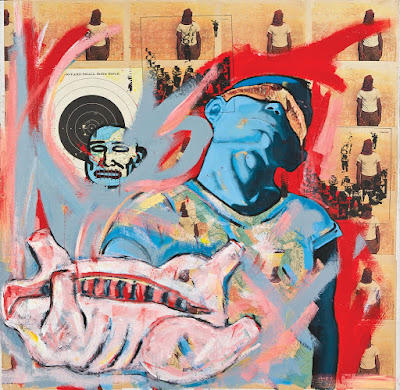David Wojnarowicz (September 14, 1954–July 22, 1992) was a prominent figure of the art scene in the 1980s. Wojnarowicz was known for his work as a painter, writer, performance artist, photographer, and activist. He is best known for the painting, Afternoon in the Forest, as well as his series of photographs entitled Arthur Rimbaud in New York. Born in Red Bank, NJ, he later attended the High School of Performing Arts in New York City.
After dropping out of school, Wojnarowicz worked along the Canadian border as a farmer, and hitchhiked across the United States, living in San Francisco for a period of time.After dropping out of school, Wojnarowicz worked along the Canadian border as a farmer, and hitchhiked across the United States, living in San Francisco for a period of time. Before returning to New York in 1978, he also lived in Paris, France. In the late 1970s and early 1980s, Wojnarowicz began to make super-8 films. One of his more notable films was called Heroin. In addition to his super-8 films, he played music with his band called 3 Teens Kill 4, and pursued photography and stencil work. In the 1980s, Wojnarowicz’s work was exhibited in galleries such as Civilian Warfare in New York. In 1985, he exhibited the collage entitled Science Lesson at the Whitney Biennial.
During his life, Wojnarowicz often collaborated with other artists such as Peter Hujar (American, October 11, 1934–November 26, 1987), Richard Kern (American, b.1954), and Ben Neill (American, b.1957). Many of his works, such as Fire in My Belly, were considered controversial. During the early 1990s, he was put in the spotlight when he filed and won a lawsuit against the American Family Association and Donald Wildmon. Wojnarowicz felt that the American Family Association misrepresented his art and jeopardized his reputation. Wojnarowicz was known for being a well-rounded artist who worked in a variety of media. After being diagnosed with HIV, he also became a prominent activist who frequently questioned medical funding, as well as art censorship. During this period, his artwork also became increasingly political. During his lifetime, Wojnarowicz also released several books including Close to the Knives. Wojnarowicz died on July 22, 1992, of AIDS-related complications.(artnet.com)






No comments:
Post a Comment